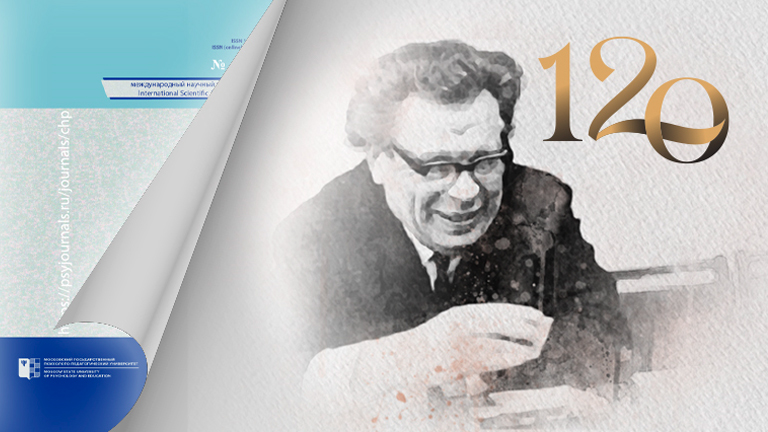The new issue of the “Cultural-Historical Psychology” journal has been published (2024. Vol. 20. No. 1).
The issue is dedicated to the 120th anniversary of the birth of Daniil Borisovich Elkonin. At the same time, this is the first issue of the journal to be published under the sign of another anniversary - the 100th anniversary of L.S. Vygotsky's Cultural-Historical Psychology, which D.B. Elkonin called “non-classical psychology”.
The theme of the issue is “The Scientific School of D.B. Elkonin and B.D. Elkonin in the Cultural-Historical Psychology of Development and Education”. The idea behind the issue belongs to the son and successor of Daniil Borisovich, Boris Daniilovich Elkonin, the editor-in-chief of the “Cultural-Historical Psychology” journal (2014 - 2023). As a thematic editor, he managed to collect the substantial “core” of the issue's materials, but this work was interrupted by his death on November 15th, 2023. This issue is both a dedication to Daniil Borisovich's anniversary and a tribute to Boris Daniilovich's memory.
Among the archival materials in this issue are two letters from L.S. Vygotsky to D.B. Elkonin. We owe the possibility of their publication to A.R. Luria, whose archive has preserved a typewritten copy of the layout of “Letters to Pupils and Associates”. The publication was prepared and commentated by T.V. Ahutina. Excerpts from D.B. Elkonin's anniversary speech at the meeting of the Academic Council of the Psychological Institute (1984) allow us to present Daniil Borisovich's scientific and life credo.
The thematic section of the issue presents one of B.D. Elkonin's last articles, where the author analyzes the method of research in Cultural-Historical Psychology, while making at the same time a final reflection of what has been done and opening new research horizons.
The article by V.V. Rubtsov, B.D. Elkonin, G.A. Zuckerman, and I.M. Ulanovskaya introduces the “A Model of the Modern School Based on the System of Developmental Education of D.B. Elkonin-V.V. Davydov” project, presented to the Presidium of the Russian Academy of Education in 2013 (these materials are published for the first time).
The experience of developing the ideas of D.B. Elkonin and B.D. Elkonin is presented in the articles on the nature, genesis, features and educational value of the trial-productive action of younger schoolchildren (G.A. Tsukerman, O.L. Obukhova, T.M. Bilibina) and younger adolescents (Z.N. Novlyanskaya, E.V. Chudinova), in the sphere of the online learning of students of grades 8 to 11 (A.A. Deryabin), as well as in the article on the relationship of mnemic abilities as “memory tools” with the nature of the arbitrary reproduction of material in activity (T.N. Osinina).
The thematic section is adjoined by a number of materials of the “Extra section”. These are articles by I. Ivich and V.V. Rubtsov, which present a modern vision of the key subjects of the work of L.S. Vygotsky and J. Piaget in their coincidences and divergences, A.D. Maidansky - on the philosophical approach of E.V. Ilyenkov (this year his centenary is celebrated) to the problem of free will, which does not diverge from the positions of cultural-historical and activity psychology and substantiates them, A.V. Novichkova - on the importance of the concept of coherence for the integration of psychological knowledge based on the ideas of F.E. Vasilyuk, as well as an anniversary interview with A.G. Asmolov.
Along with this, the reader will be able to familiarize themself with the history of the use of the Rorschach test in the USSR in the 1920-1930s, which was highly appreciated by L.S. Vygotsky (an article by E.Yu. Nikonova and G.P. Rupichev), and with the results of empirical verification of the previously formulated provisions on the constructive functions of dreams in the second part of the article by E.N. Osin, P.A. Egorov, and N.B. Kedrova.
The issue concludes with an essay by A.V. Suvorov, who passed away on January 26, 2024, “Life and Stagnation”.
